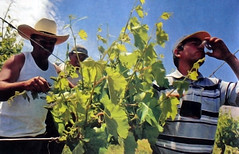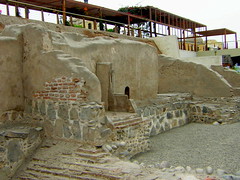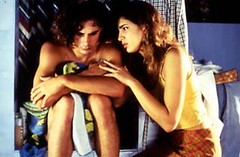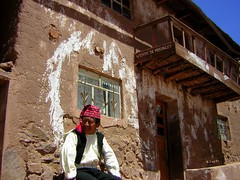New Year Traditions: Die!…Muñeco…Die!
Tom Filipowicz in Chiclayo recounts the tradition of burning mannequins as part of New Year celebrations in Peru, as well as other customs.
Article brought to you by Mochica Hostess Tours

President Alan Garcia – Politicians are great for burning
Hundreds if not thousands of muñecos suffered fiery deaths in Chiclayo last night. Gleefully set aflame by cheering men, women and children, most of these unfortunate creatures were less than one week old, and had either been purchased like slaves or raised by families with the intent to end their short lives.
Muñecos truly are born to die.
And that’s a good thing, because muñecos represent everything bad that happened the previous year, which is why they are burned.

Chiclayo, New Years Eve
Burning muñecos is not as widespread as it once was, primarily because city authorities discourage the practice due to the tremendous amount of thick, black smoke, the obvious fire hazard, and because many of the dirt roads have been covered with asphalt which is damaged by the intense heat. The process usually starts two to five days in advance with families constructing muñecos from old clothing and stuffing them with straw and just about anything else that will burn, including plenty of fireworks.

Muñencos for sale
Others buy ready-made muñecos like these for about $4. On a dirt street such as the one in this photo there were probably muñecos burning in front of every house. Last year was my first time seeing this tradition, and for a moment I actually thought the entire neighborhood was going up in flames.
But burning muñecos is only part of the New Years Eve tradition. It really starts with yellow underwear. Everyone – man, woman and child wears new, never been worn yellow underwear the day of New Years Eve. It is an important part of insuring good luck for the coming year and doesn’t seem to tarnish the macho image. Less common is the custom of bathing in yellow flower petals before putting on the underwear. Yellow flowers were being sold on many street corners yesterday. A lesser seen but still common custom is to literally run completely around the block carrying bags of clothing while the meñeco is burning. This is done by people who hope to travel to another country during the year.
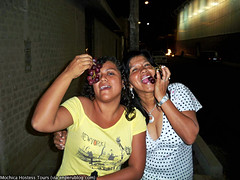
Grapes at midnight
At exactly midnight you and your yellow underwear set fire to the muñecos. While the muñecos burn and the fireworks explode, everyone – family members, neighbors and anyone else in the area hug and wish each other a happy new year. When the hugging is done grape eating begins. Every person eats twelve grapes – one for each month, and makes a wish as each grape is eaten. As I understand it, for the wishes to come true it is vital to be wearing your yellow underwear.
After the grapes have been eaten and the muñecos have turned to ashes (though fireworks continue to sporadically explode…muñecos die hard) the families enter their houses and a champagne toast is proposed by the family patriarch asking for a blessing and good luck for the new year. It is my theory that the yellow underwear, hugging, grapes, and toasts don’t work, because if they did, there would not have been any bad luck the preceding year and thus no reason to burn a muñeco. Maribel does not accept this line of reasoning. I am not certain how seriously Chiclayanos regard these customs, but there is an undeniable degree of belief as they perform them.
Somewhere around 1:00am dinner is eaten. The menu for this meal is much less strict than for Christmas, though turkey is still a popular item and paneton with hot chocolate are mandatory. When dinner is finished and plates are washed and put away dancing begins. Most families dance in their homes or in the street and the sound of Latin music blaring from nearly every house doesn’t begin to diminish until sometime after 4:00am. Others elect to dance at a disco, which entails changing into different clothing and arriving at the disco at about 2:00am. Still others – the youthful crowd, go to Pimentel and party on the beach, which is also their bed for the night. What did we do? When dinner finished at 1:30 we skipped the disco scene and were in bed by 2:30.
Today will be a slow day. People sleep late, stores are closed and except for blowing muñeco ashes there isn’t much movement on the street. Later people will be visiting families. With no football available to me, I’ll probably take a nap.
Happy New Year.
If you’d like to experience events like this and get a taste of real daily life in northern provincial Peru, speak to Tom & Maribel via Mochica Hostess Tours
Tags: chiclayo, customs, Mochica Hostess Tours, new year, traditions



